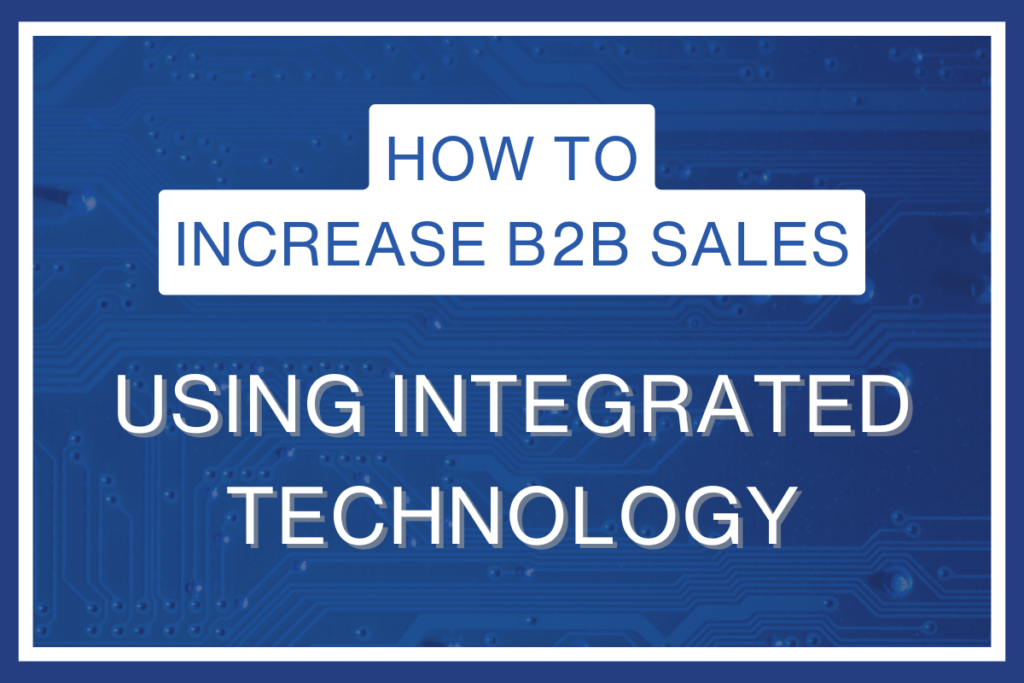How to Increase B2B Sales using Technology and Integration

If you’re looking to increase B2B sales using technology, the key is to take a strategic approach. By integrating the right tools into your sales processes, you can make a real difference. Your sales team will operate more efficiently, and your customers will notice the improved experience. Ultimately, this can drive more revenue for your business.
In this blog, we’ll discuss how well-integrated technology can transform your B2B sales.
From automating your CRM, to giving your sales reps access to real-time data, we’ve covered everything you need to know. Let’s explore how these tools can help you stay competitive and grow your sales.
Integrate ecommerce platforms with ERP systems
For businesses managing large inventories and online sales, integrating your ecommerce platform with your Enterprise Resource Planning (ERP) system is critical. Your ERP system manages essential business processes, including procurement, accounting, and inventory. When your e-commerce platform is linked with your ERP, it ensures information flows smoothly between the two systems.
This integration ensures product data, pricing, and stock levels are always up to date across all customer-facing platforms. For example, when a customer places an order, the ERP system automatically updates inventory levels and triggers the necessary steps in the order fulfilment process. This removes the need for manual data entry and reduces the risk of human error, improving fulfilment times.
By integrating these systems, you also enhance the customer experience. Customers will see real-time stock availability and accurate pricing, reducing the likelihood of abandoned carts. Improved order accuracy and fulfilment times lead to higher customer satisfaction and loyalty. Furthermore, your sales reps have access to the most up-to-date information, enabling them to give customers accurate insights and recommendations.
Empower sales reps with mobile technology
Sales reps are often on the move, meeting clients and visiting trade shows. Mobile technology enables them to stay connected and productive, no matter where they are. By equipping your sales reps with mobile apps that integrate with your CRM and ERP systems, you provide them with real-time access to customer data, product information, and inventory levels.
Mobile sales apps allow reps to update CRM records, manage leads, and close deals on the go. For example, if a rep meets with a customer, they can check real-time stock availability and place orders instantly. This speeds up the sales process and ensures that reps always have the latest information at their fingertips.
Mobile technology also enhances customer engagement. With access to real-time data, sales reps can provide clients with tailored solutions, addressing their needs more effectively. This leads to improved client satisfaction and higher conversion rates. In an increasingly competitive market, being able to deliver accurate, real-time information gives your team a competitive advantage.
Streamline Product Information Management (PIM) and Digital Asset Management (DAM)
For companies with large product ranges, managing product information can be challenging. Inaccurate or inconsistent product data leads to inefficiencies and poor customer experiences. Integrating Product Information Management (PIM) and Digital Asset Management (DAM) systems with your e-commerce and ERP platforms ensures that all product data is centralised and up to date.
PIM systems allow you to manage product descriptions, specifications, and pricing from one platform, while DAM systems store digital assets like images, videos, and documents. When these systems are integrated with your ERP, you ensure accurate product data and assets are consistently available across all channels.
This not only streamlines internal operations but also improves the customer experience. Customers can access detailed, accurate product information and visuals, helping them make informed purchasing decisions. Additionally, marketing teams benefit from having easy access to the latest digital assets, enabling them to launch campaigns quickly and effectively.
Optimise CRM systems with automation
Your Customer Relationship Management (CRM) system is the foundation of your sales operation. A robust CRM helps your team track interactions with customers, manage leads, and monitor sales pipelines. However, integrating automation tools into your CRM takes this to the next level. Automation can handle routine tasks such as data entry, follow-up reminders, and email campaigns.
For example, instead of manually entering data from meetings, the CRM can automatically log and categorise interactions. Automation can also schedule follow-up emails or reminders based on customer activity. This frees up your sales reps to focus on what they do best—building relationships and closing deals. By reducing manual tasks, the integration of automation into your CRM boosts efficiency and ensures consistency in customer communications.
Beyond just sales, CRM automation helps streamline marketing efforts. Automated campaigns can send personalised messages based on customer behaviour or specific triggers, ensuring more targeted communication. This makes your team more responsive to customer needs and improves conversion rates.
Leverage data analytics for informed decision making
Data is one of the most powerful tools in B2B sales. Integrating analytics software with your CRM and ERP systems enables you to harness valuable insights from your data. Analytics tools allow you to track key metrics such as sales performance, customer behaviour, and product trends.
For example, analysing sales data can help you identify which products or services perform best in specific markets. This insight allows you to tailor your sales strategy and focus on high-performing products. Additionally, analytics can help you understand customer buying patterns and segment your audience based on behaviour. This enables your team to deliver more personalised and effective sales pitches.
Data analytics also supports demand forecasting. By analysing historical data, your business can predict future sales trends and adjust inventory levels accordingly. This helps avoid stock shortages or overstocking, which can impact profitability. With the right insights, you can make data-driven decisions that boost your sales strategy and overall performance.
Improve communication with unified platforms
Effective communication is essential for successful sales. Unified communication platforms bring together email, chat, and video conferencing into one system. When these platforms integrate with your CRM, all interactions between your team and customers are recorded in one place.
This centralised communication system ensures that sales reps have full visibility over previous interactions, whether via email, phone, or video call. As a result, they can provide a consistent experience across all communication channels. Unified platforms also improve internal communication by allowing teams to collaborate more effectively. Teams can share updates and files in real time, making it easier to work on joint projects or quickly address customer queries.
Additionally, integrated communication tools help improve response times. With all communication channels in one place, your team can respond to customer inquiries more quickly and efficiently, leading to stronger relationships and a more responsive service. In the fast-paced B2B environment, quick and clear communication gives you an edge over competitors.
Conclusion
Integrating technology into your B2B sales process can lead to significant improvements in efficiency, customer satisfaction, and revenue. By optimising CRM systems with automation, connecting e-commerce platforms with ERP systems, leveraging data analytics, and improving communication, your business can create a more seamless and effective sales operation.
At Aspin, we offer a range of solutions tailored to help you achieve these outcomes. Our mobile sales apps for reps, trade websites, and integrated PIM/DAM systems are designed to support your business’s unique needs. With our technology, you can ensure your team stays ahead of the competition and continues to drive B2B sales growth.
Related Articles




